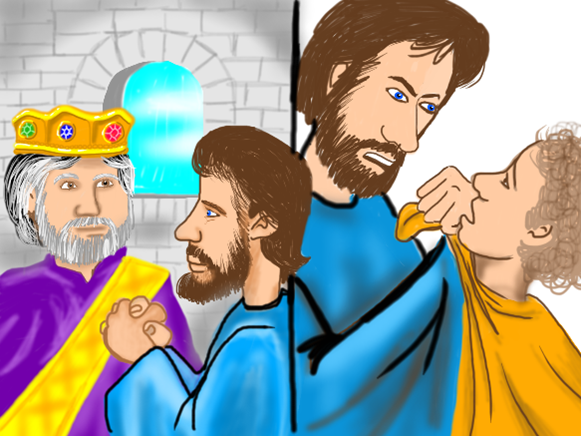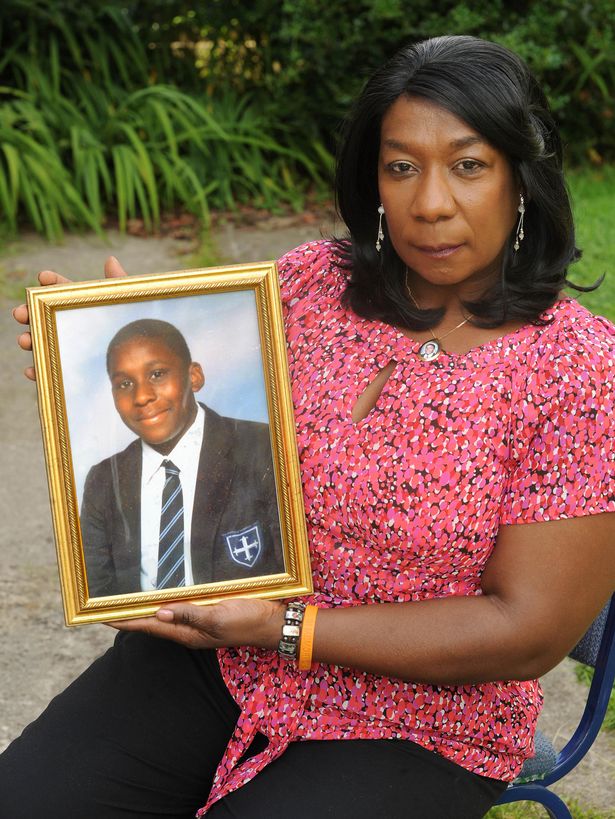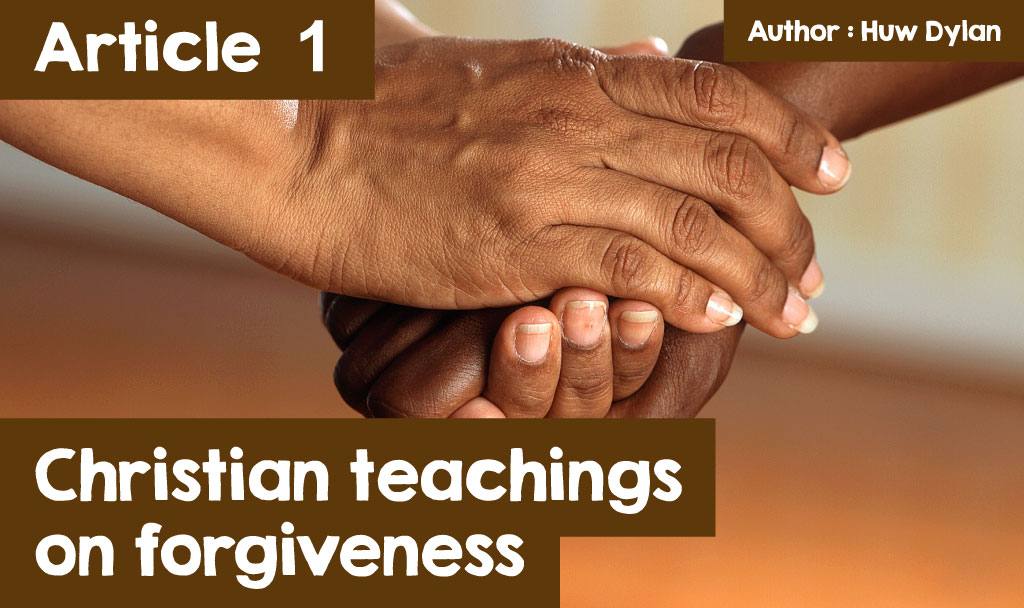‘I forgive you’
How easy is it to say those words? How easy is it to forgive someone? Many people would say that it is one of the most difficult things to do in life, especially if the other person has seriously hurt you, either physically or emotionally. What exactly does forgiving someone mean? Well, if you looked in a dictionary for a definition of forgiveness you would probably see something like this - 'a conscious, deliberate decision to release feelings of anger or revenge towards a person or group that has harmed you, whether they deserve your forgiveness or not. 'You have probably heard the English saying - 'forgive and forget' and many would argue that it is not possible to truly forgive unless you forget the transgression or wrong the person has committed against you and start the relationship over again. That of course is what makes forgiveness so difficult to achieve. Can you forgive without forgetting, or does remembering the offence mean that you still keep some desire for revenge in the back of your mind? What do you think?
The New Testament is very clear in its teaching about forgiveness. Put simply, Christianity believes that if you expect to be forgiven by God or by other people, you yourself must be ready to forgive. This is a conversation between Jesus and Peter in the Gospel of Matthew, chapter 18 in the Bible - 'Then Peter came to Jesus and asked, “Lord, how many times shall I forgive my brother or sister who sins against me? Up to seven times?” Jesus answered, “I tell you, not seven times, but seventy-seven times.” ' (Beibl.net).
Here Jesus says that he is always expected to forgive, whatever the offence. He then goes on to tell a parable of the unforgiving servant (Matthew 18:21) - a king had lent money to his officers and wanted to settle the accounts. As he began the work, a man who owed him millions was brought to him. The officer was not able to pay the debt, therefore the master ordered that the officer and his wife and children be sold as slaves, and that all his possessions also had to be sold, to pay the debt.
“The man fell to his knees before him, and pleaded, ‘Give me time, and I will pay back everything to you.' Because he took pity on him, the master cancelled the entire debt and let him go. But when the man went outside, he found one of his colleagues who owed him a small debt. He grabbed him and began to throttle him, saying ‘When are you going to pay back what you owe me?’. His colleague fell to his knees and begged him, ‘Give me time, and I will pay back everything to you.' But the man refused to listen to him. Instead, he took the matter to the authorities, and his colleague was thrown into prison until he could pay the debt.

When the other servants saw what had happened, they were very upset and went and told the king everything that had happened. Then the king called the man back in. 'You wicked man! he said, 'I cancelled all that debt of yours because you begged me to. Shouldn’t you have forgiven your colleague just as I forgave you?' The king was angry and ordered that the officer be thrown in jail to be tortured, until he paid back all he owed.” “This is how my heavenly Father will treat each of you unless you fully forgive each other.”(Beibl.net)
The parable teaches us that if we are not prepared to forgive, we have no right to expect to be forgiven either. Many Christians believe that only those who ask for forgiveness should be forgiven. Why is that important to them? Well, if a person asks for forgiveness it clearly shows that the person is sorry for what he or she has done and therefore deserves to be forgiven, whatever he or she has done. But other Christians are of the opinion that the offender should be forgiven, whatever his or her response. And of course Jesus forgave those who crucified him without them asking him to forgive them - “Father, forgive them; for they know not what they do.” What is your opinion?
What is the importance of forgiveness? Well, forgiveness is very important to the individual and to society in general.

Gee Walker with a photograph of her son, Anthony
© Mirror
Anthony Walker was an 18-year-old boy who lived in Liverpool and had his whole life ahead of him. He was a talented boy, studying A Levels and was expected to get an A grade in all his subjects. His intention was to go on to study law at university. Like the rest of his family, he was a committed Christian. On 29 July 2005, he had been babysitting his nephew with his girlfriend, Louise Thompson. At the end of the night, he and his cousin Marcus Binns Thompson walked to their bus stop near the Huyton Park pub, and that is where 17-year-old Michael Barton saw them. When he saw the two, he shouted racist names at them and told them to walk away. And to avoid trouble, that's what the two did, cutting through McGoldrick Park to get to another bus stop. But this was not enough to stop Barton. After they walked away, Barton and Taylor got into their car and drove after them. Arriving at the entrance to the park before the two friends, they hid in the bushes and waited for them. Once they arrived, Anthony was viciously attacked with an ice axe, and hit on the skull. Anthony was taken to hospital but died there the next morning. When those who murdered him were found guilty in November of that year, Anthony's mother, Gee, made this statement in front of the court -
“I can't hate. We're a forgiving family and it extended to outside, so it wasn't hard to forgive because we don't just preach it, we practise it. I brought up my children in this church to love. I teach them to love, to respect themselves, and respect others. What does bitterness do? It eats you up inside, it's like a cancer. We don't want to serve a life sentence with those people.”
This couldn't have been an easy decision, but because of her belief, she was able to forgive her son's murderers, but she believed that this was the only way she could have peace of mind and avoid being eaten up by negative feelings such as revenge, hatred and bitterness. She believed it was important that she practised her faith, did what she believed and followed the example of Jesus.
Forgiveness is important for communities too because the only way to have reconciliation between two clashing sides is through forgiveness.

Nelson Mandela
(© Kingkongphoto & www.celebrity-photos.com)
One who understood the power of forgiveness better than anyone was Nelson Mandela and that was because of his Christian faith. He was in prison in South Africa for 27 years because of his opposition to Apartheid. When he was released you would have expected him to want to take revenge on those who had kept him locked up for so long. But he knew how destructive revenge was, and if he wanted to succeed in building a new South Africa he had to get the different sides within the country to forgive each other for what had happened in the past. This was what he said when he was released, “As I walked out the door toward the gate that would lead to my freedom, I knew if I didn’t leave my bitterness and hatred behind, I’d still be in prison." He personally forgave those who had imprisoned him.
As the first black President, many believed that Nelson Mandela succeeded in changing South Africa into a Rainbow nation, all the different colours working together through the power of love and forgiveness – “No one is born hating another person because of the colour of his skin, or his background, or his religion. They must learn to hate, and if they can learn to hate, they can be taught to love, for love comes more naturally to the human heart than its opposite.”


